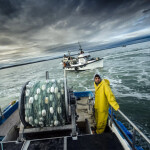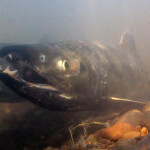Editor's note: This letter to the editor from Marianne Cufone, director of the fish program at Food & Water Watch, is in response to the 26 May commentary "Fish farms don't explode."
Some in the aquaculture industry are arguing that open-ocean aquaculture (OOA) should move forward in the Gulf of Mexico in light of the Deepwater Horizon explosion. While a fish release can't be compared to an oil spill like the one that is unfolding in the Gulf, the industry is always too quick to downplay the ecological problems associated with OOA.
That's why the bill introduced last week by Sen. David Vitter (R-La.) to delay permitting of OOA facilities — in the Gulf and elsewhere in federal waters — just makes sense.
Industrial fish-farming facilities probably won't explode and catch fire (unless they happen to be attached to an oil rig — an idea promoted by many would-be ocean fish farmers and even some in our federal government), but they do break. And when they break, they "pump" fish and pollutants into the ocean.
For example, open water salmon farms in the North Atlantic result in about 2 million fish escapes each year. When farmed salmon escape into open water they can carry a number of diseases (brought on by the stress and cramped conditions of their confinement) and parasites (like sea lice), and can proceed to perpetuate these diseases in wild populations. Escaped fish often weaken wild fish stocks.
In addition to the potential consequences of a mass escape from industrial facilities, OOA raises other concerns for coastal communities and the marine environment. One of the most problematic is marine pollution from uneaten fish food and waste. A shocking study in 2000 found that Scotland's 350 marine salmon farms produced pollution with ecological impacts greater than the sewage produced by the country's entire human population. This type of waste often contributes to toxic algal blooms, hypoxic zones and "plumes" of pollution on the surface of water surrounding cages.
Ocean aquaculture also threatens marine wildlife, ranging from California sea lions and seals to great white and tiger sharks. All of these creatures have suffered documented — sometimes deadly — interactions with open-water aquaculture facilities.
The Gulf is now witnessing its greatest disaster unfold and promoting OOA in the region just adds insult to injury. Fish farms may not literally explode, but if the industry itself explodes before we can control its cumulative impacts on coastal communities and the marine environment, we will have another disaster on our hands.
Marianne Cufone,
Food & Water Watch





